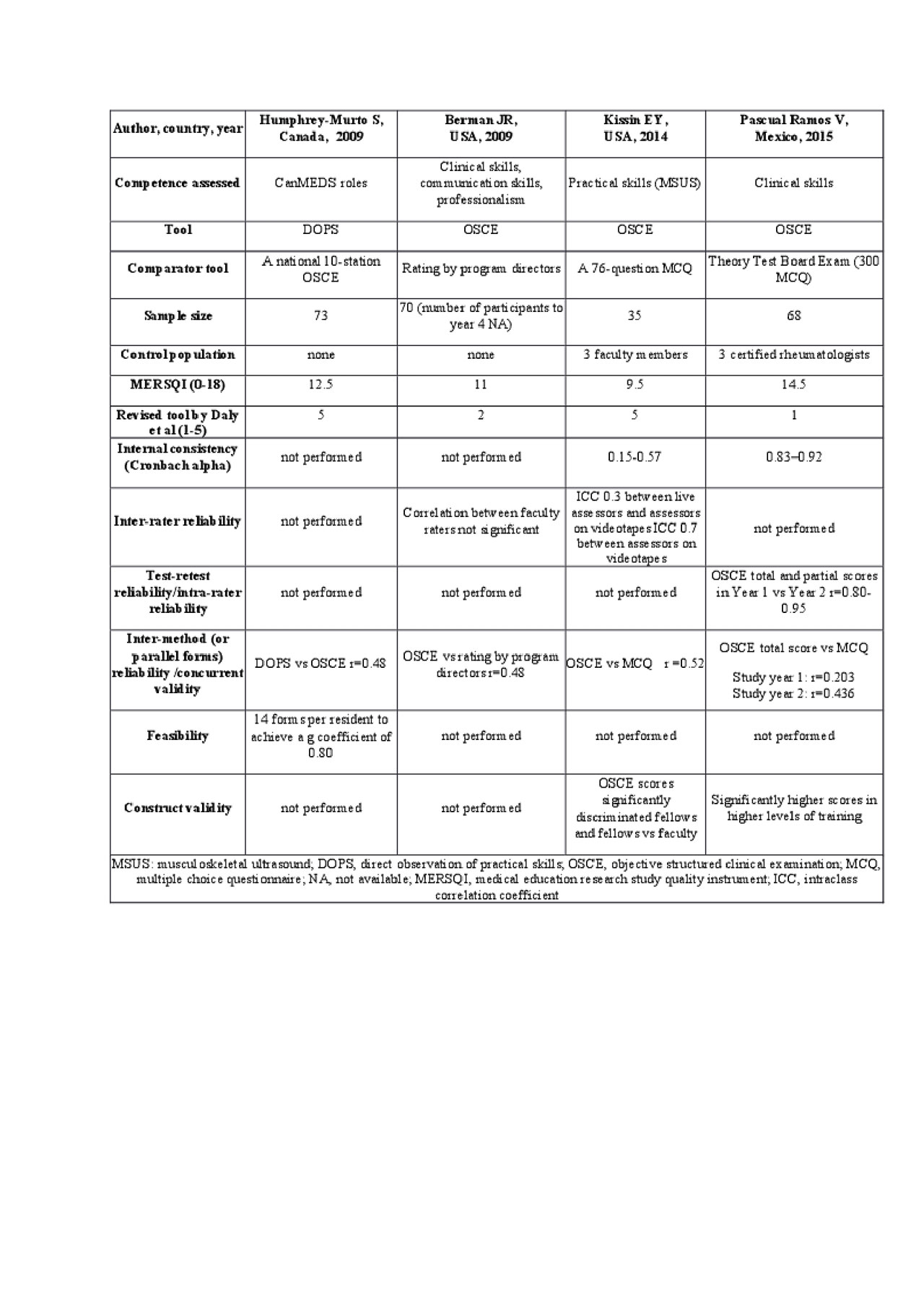Session Information
Date: Sunday, November 10, 2019
Title: Education Poster
Session Type: Poster Session (Sunday)
Session Time: 9:00AM-11:00AM
Background/Purpose: The structure and content of Rheumatology training programs vary widely among European countries. Harmonization of assessment methods of competences across EULAR countries could contribute to ensure a minimal standard of care. Our objectives were to To summarize the available information on competence assessment methods and strategies in postgraduate medical training in rheumatology and other specialties.
Methods: As part of a EULAR taskforce on the assessment of competences in rheumatology training, a systematic literature review was performed. Two reviewers independently identified eligible studies according to the PIM framework: P (population): trainees, fellows; I (instrument of interest): assessment strategies and methods; M (measurement of properties of interest): validity, discrimination, feasibility. one search for rheumatology and one for related medical specialties and extracted data on assessment methods. Two searches were conducted: (i) for rheumatology, retrieving original studies; (ii) for related medical specialties, retrieving SLRs through which we identified original studies. Risk of bias was assessed using the medical education research study quality instrument (MERSQI).
Results: Of the 6,276 articles in rheumatology and 2,265 reviews from other specialties, 4 and 31 original studies were included, respectively. Studies in rheumatology were at variable risk of bias and explored only direct observation of practical skills (DOPS) and objective structured clinical examination (OSCE). Rheumatology OSCEs including clinical, laboratory and imaging stations performed best, with a good to very good internal consistency, and inter-rater reliability. OSCEs correlated fairly to moderately with other assessment tools, including DOPS. Studies on OSCEs on clinical skills in other specialties showed a good to very good inter-rater reliability, while OSCEs on communication skills consistently demonstrated a good to very good internal consistency. Other tools such as multisource feedback (MSF) and mini-clinical evaluation (mini-CEX) exercise showed a good feasibility and internal consistency, with conflicting data on validity and reliability.
Conclusion: Although there is a consistent body of evidence about assessment of competence in postgraduate medical training in several specialities, data in rheumatology is scarce and this partial picture indicates some conflicting evidence. OSCEs represent an appropriate tool to assess clinical competences and correlate fairly well with other assessment strategies; DOPS, MSF and mini-CEX are other feasible alternatives. This SLR informs the ongoing initiative to formulate EULAR ‘points to consider’ for the assessment of competences in rheumatology training.
To cite this abstract in AMA style:
Alunno A, Najm A, Sivera F, Haines C, Ramiro S. Heterogeneity of Strategies and Methods for Assessment of Competences in Rheumatology Training: Results of a Systematic Literature Review to Inform EULAR Points to Consider [abstract]. Arthritis Rheumatol. 2019; 71 (suppl 10). https://acrabstracts.org/abstract/heterogeneity-of-strategies-and-methods-for-assessment-of-competences-in-rheumatology-training-results-of-a-systematic-literature-review-to-inform-eular-points-to-consider/. Accessed .« Back to 2019 ACR/ARP Annual Meeting
ACR Meeting Abstracts - https://acrabstracts.org/abstract/heterogeneity-of-strategies-and-methods-for-assessment-of-competences-in-rheumatology-training-results-of-a-systematic-literature-review-to-inform-eular-points-to-consider/

